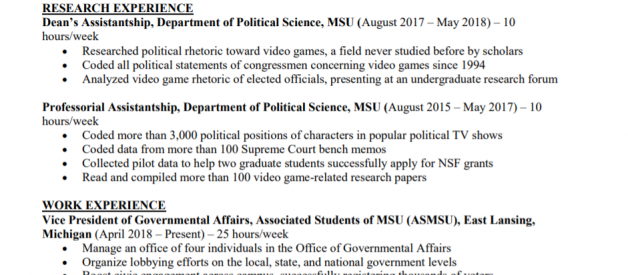As some of you know, I?ve been really lucky with my results during this application season, including being admitted to Yale Law School. I was stunned and wanted to pay it forward for future law school applicants. Below, I?ve included my law school materials, application advice, and LSAT study tips for anyone that wants them. Skip to the sections you?re interested in; I have them labeled. I hope the information is helpful. I?ll be willing to answer any additional questions in the comments.
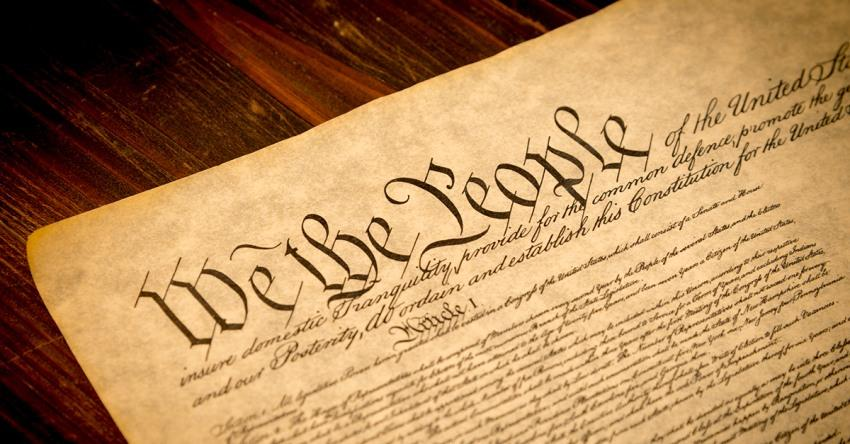
One thing before I begin ? a few resources I want to recommend. The first, the Law School Admissions subreddit, is a wonderful resource for learning about applying to law school and an incredibly positive internet community overall. Heavy recommend. Another resource, LawSchoolNumbers, is great for checking on the stats of individuals getting into schools you?re targeting. Finally, I recommend using a few admissions-related calculators (here and here) just to see the sorts of stats you need to target the schools you want (this is based on self-reported data, so worth taking with a grain of salt).
First, you?ll see my actual application materials. Further down you?ll see my thoughts on the law school admissions process in general and my LSAT advice. One other thing to note: My recommendation letters aren?t here, and obviously I haven?t seen them myself. That?s a part of my application that none of us have access to so we can?t really know for sure what that part of my app looked like. I also didn?t include university-specific essays here. If you want to see one of those you can send an email to [email protected] and I can send a copy.
The personal statement
Below, I?ve included the personal statement I sent to law schools. I generally think this is a great space to show off more about yourself to the law school and make the case for why you?re an interesting person. One thing you?ve gotta remember: Your recommenders will ideally be already talking about your accomplishments, your work ethic, etc. You don?t really need to accentuate that so much in your personal statement if you?ve already got someone else writing a letter about you. There are probably better ways to use the two pages you have for your personal statement.
My personal statement
Like most 14-year-olds, I eagerly awaited the Supreme Court decision in Brown v. Entertainment Merchants Association. The case was not considered a blockbuster, but it was of utmost importance to me. Justice Scalia, a jurist with whom I frequently disagreed, delivered the opinion, ruling that video games were protected by the First Amendment. Just as the government could not stop children from reading Grimms? Fairy Tales, Scalia wrote, it also could not censor the content in video games.
Following the Brown decision, I began to engage with gaming on a deeper level. Instead of just playing video games, I decided to look at their broader implications. What effect did the industry have on society? How did it relate to other important spheres like politics? I had plenty of time for study. My parents saw nothing good in the medium and often grounded me from ?screen time.? Unfortunately for them, this only amplified my interest. For every additional minute grounded, I spent another minute reading or listening to a podcast about video games. I also began writing. At first, I wrote on a personal blog attracting a few thousand followers. Eventually, I was brought on as a paid writer for Nintendo Enthusiast, a larger game website.
I did not just write from home, but began traveling for the website from Los Angeles to Germany. As I spoke to different developers, it was fascinating to see the speech and censorship laws implemented by various governments. Germany, for example, prohibits swastikas from appearing in games. This is an important detail in a game like Wolfenstein, where the objective is to take down the Nazi regime. Nazis in the game were evil, not glorified, yet the government still did not allow the symbol to be portrayed. It seemed strange to imagine a similar regulation in the United States.
Entering college, I knew I wanted to work in the burgeoning field of First Amendment law. Although fields like television and radio have plenty of settled precedent, many free speech questions have not yet been litigated in the rapidly changing digital age. New technology is constantly being introduced, and the courts are struggling to keep up.
I wanted to begin studying media and policy. Fortunately, in Professor Ryan Black I found a mentor willing to indulge my curiosity and in Michigan State University an institution willing to support my budding research. My first year, I began putting together a database of video game research. I read through hundreds of papers, trying to find what substantive research had been done on the art form I had fallen in love with. To my disappointment, the researchers frequently utilized poor research methods. The conclusions were sweeping, but the data had little real-world validity. The lack of credible literature on an industry worth over $80 billion a year was appalling. I felt it necessary to contribute to the field?s study.
My junior year, I received funding to perform my own research on elected officials? rhetoric toward video games. It was a question I found particularly interesting given the fact that the industry spends millions of dollars each year lobbying Congress. Unlike guns, game regulation did not seem partisan. I wanted to find out if the game industry was favored by one political party over another, an area of research completely unexplored by scholars. After a year of coding every Congressional statement about video games from the last 25 years, I found a significant difference in attitude between the two parties. Eventually, I presented my research at an undergraduate research forum. I also found that neither party had a particularly rosy view of video games. Elected officials frequently blamed video games for all sorts of societal problems and frequently suggested censorship to cure society?s ills.
From my background, I knew that our First Amendment rights were non-negotiable. My parents, refugees from the Soviet Union, taught me from a young age the indispensable values of free speech and freedom of religion. I saw the danger at home when watching Russian programming with my grandparents. Russian television was simply Putin?s propaganda parading as news. There was no clearer example of the dangers of censorship than when flipping between Russian and English channels.
As a constitutional lawyer, I hope to act as a defender of free speech. Now, more than ever, the news media needs legal protection from government actors claiming news to be libel. Meanwhile, video games and other new media are grappling with free speech questions for the first time and need attorneys that understand quickly changing technology. I also hope to act as a resource for digital companies struggling with their online policies. Many social media platforms are scrambling to write a Terms of Service that can be efficiently and equitably enforced across all their users, while still promoting free speech. My law school education will uniquely prepare me to face rapidly approaching First Amendment questions as they surface, and there?s no better place to acquire these skills than Yale Law School.
The diversity statement
Alright. I don?t have much advice for this one other than this: If you?re trying to figure out a way to write a diversity statement, you probably shouldn?t write one. It?s far better to not have a diversity statement than to try to put one together that would solicit an eye roll. I can?t say much else because I feel the diversity statement is something I can?t generalize advice about. Below, you?ll find a diversity statement I sent to Columbia. I actually didn?t send one to Yale because I thought my other application materials did a good enough job already and too much information might be overkill.
My diversity statement
I was born before either of my parents were granted citizenship, but thanks to birthright citizenship I am able to have my piece of the American dream. My parents, refugees from Belarus, escaped religious persecution and came to America with nothing. Living with my grandparents until their mid-twenties, my parents took every government ?handout? they could possibly get. They still have about $300,000 in medical school loans to pay off, but my parents have done everything they could to give me the opportunities they never had. Their experience has profoundly shaped my worldview, my work so far, and my future career choice.
Having the opportunity to speak to my grandparents and other older members of the Russian-American community has also given me a realistic view of the horrors of the Holocaust. Though the events occurred 70 years ago, we are not far removed. My grandparents successfully ran from the Nazis, but many other family members weren?t so lucky. Just two generations ago we faced the evils of Hitler, and since then the world has seen no shortage of atrocities. Complacency is unacceptable, and I am so humbled to be able to speak to my grandparents about their struggles in their native language.
Contrasting America to the Soviet Union has given me an immense appreciation for our constitutional rights. For me, this respect has manifested itself in registering voters. In college, I have approached voter registration in a systematic manner. Through targeted dorm canvassing, registration at freshmen orientation, and coordination with other student groups, we have been able to successfully register nearly 4,000 people to vote since the summer began. My role as the president of MSU College Democrats has also made me a plaintiff on a federal lawsuit seeking relief to two especially disenfranchising laws in Michigan. For me, voting rights are essential to a well-functioning democracy, and I have taken every avenue I can to ensure college students have access to the ballot box.
As a constitutional lawyer, I hope to safeguard the rights of media publications, artists, protesters, and all those who want to express their First Amendment rights. At Columbia Law School, I will bring a unique appreciation for the constitution into the classroom. Many people take their rights for granted, and most young people do not even vote. I hope my activism and passion will motivate other students to fully value the rights my parents were born without.
My resume
I don?t have a ton of advice to add on this, so I?ll just paste below the resume I sent to most schools. Yale asked for a different format, so the document below isn?t the exact one I sent them. This resume isn?t current, but the one I sent at the time of application. One piece of advice, though: Don?t make your resume too long. I had to cut off a decent chunk of stuff here. Realistically the most important stuff will be enough (this is a two-page resume).
While your work background is important, statistically speaking, your GPA and LSAT are more important (with some exceptions, of course). Generally, you should not compromise your grades for an extra student group position, for example. Don?t overextend yourself (I didn?t listen to my own advice).
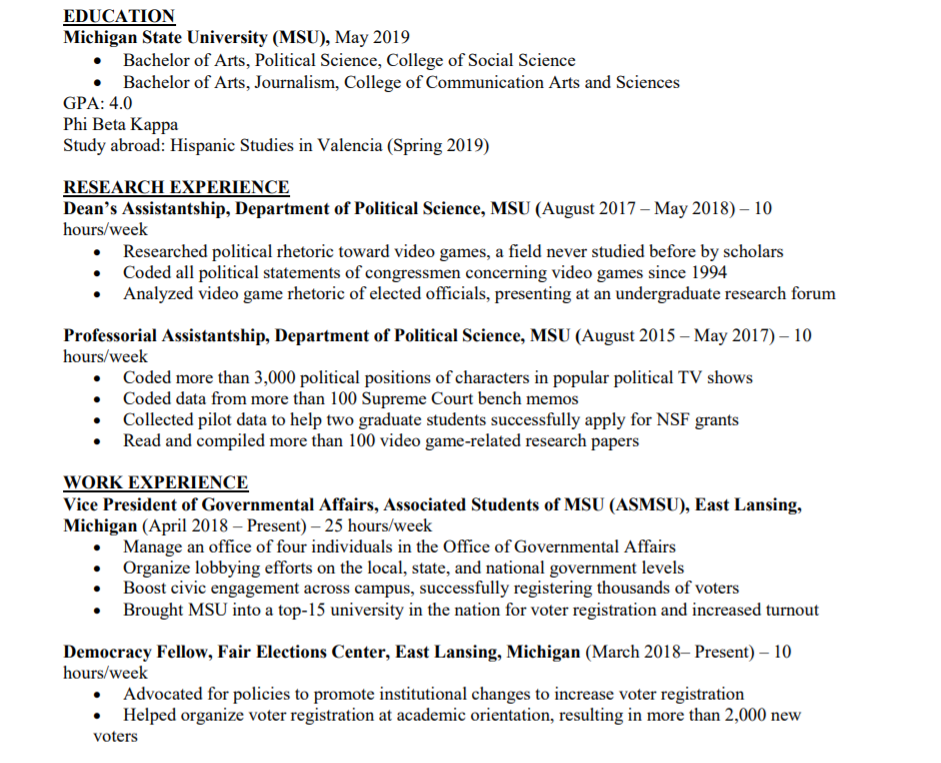
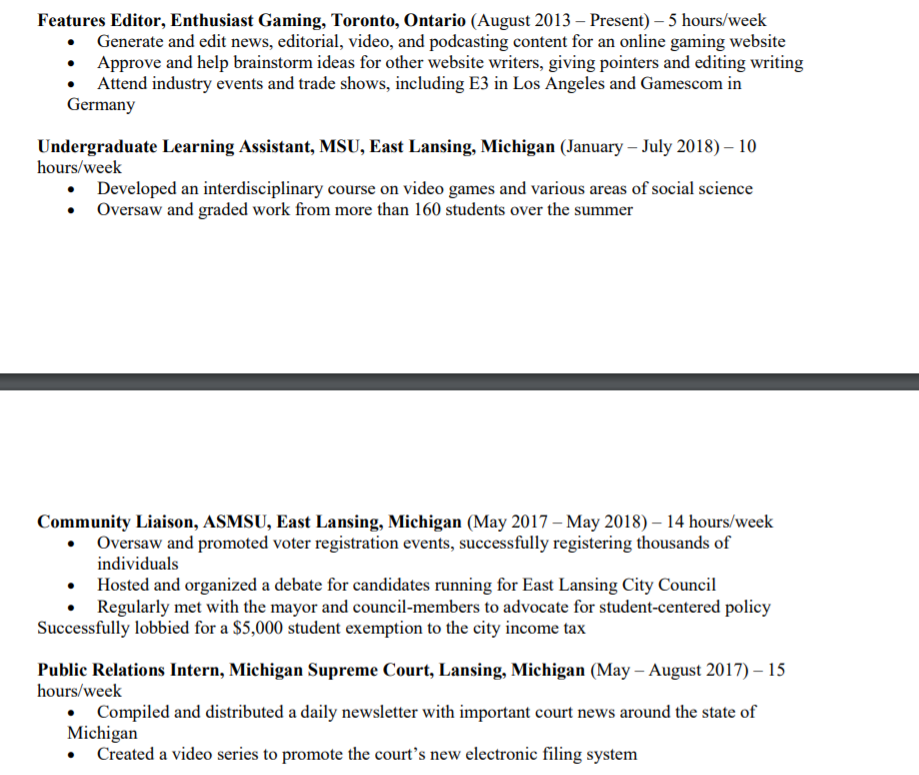
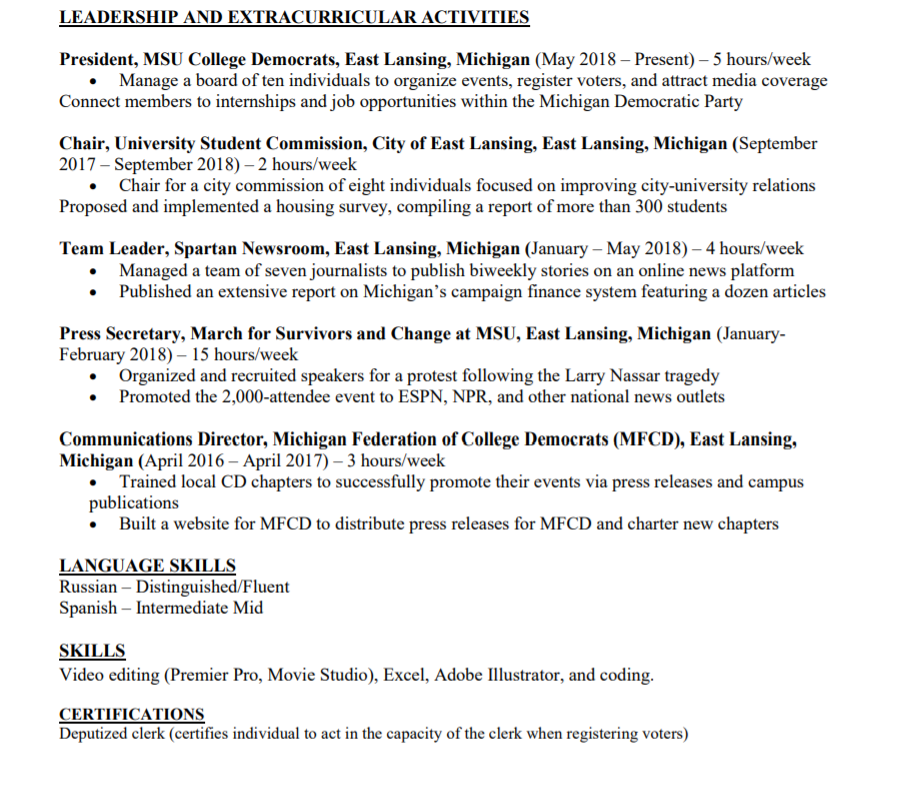
On thinking about law school
Law school is a serious investment of your time and money. Before committing such a substantial portion of your life, you want to ensure that you are making the best choice possible for your future. One of the best resources out there is Law School Transparency. This is a non-profit group that tracks employment outcomes, income statistics, and cost of attendance information. It is an invaluable resource when making law school decisions.
Here?s an example. Michigan State University, for example, has a total cost of about $240,000 without any scholarships. The overall median salary upon graduation, meanwhile, is $63,000 while the median salary in private practice is $75,000. Don?t get me wrong, without any debt, these salaries would be wonderful salaries coming out of any school. But with interest, you could be staring at $300,000 in debt after graduating. When your debt is four times your annual salary, how could you ever pay it off?
One more statistic is important: the percent of graduates in jobs that require a JD. At MSU, roughly 60% of graduates are in jobs that require passing the bar. For a Law School, I find it a bit concerning that nearly 40% of students won?t have jobs that require a JD after graduating. Overall, for a school like MSU, it would be tough to justify paying full tuition when the outcomes aren?t great. Which leads me to my next point?
The LSAT
The LSAT is the single most important part of your application. It sucks. I hate that a 4-hour test is more important than 4-years of your life at university, your work experience, and everything else you have to offer. Unfortunately, that?s the name of the game. Fortunately, I firmly believe that the LSAT is a test anyone can learn.
From my very first practice test to my final score, I improved 17 points on the LSAT. Between my first and second official examination, I improved ten points (I went from a 165 to 175 between my first and second take). I truly think anyone can score above a 170 on the exam if they put in the time studying. Anyone. Above a 170, in my opinion, comes down to luck. Did you get questions that were kind to you? Were the reading prompts up your ally? But, other than that, the test is learnable and anyone can figure it out.
However, that means a lot of time you need to commit. I studied for the LSAT for a total of nearly 10 months. I put well over 250 hours into studying. For me, the logic games section was the hardest part to perfect; I did every section ever released. Twice. The LSAT is arguably one of the most important tests a lawyer will ever take. If you don?t respect the test, it can really change the trajectory of your life. So, please, please, please, please give the LSAT the time and respect it deserves.
Some people estimate the LSAT is worth about 65% of your application. If you spend four years of your life making sure your GPA is great, you are doing yourself a great disservice not putting a significant fraction of time into the LSAT. On the contrary, if your GPA is on the weaker side, the LSAT gives you a really good chance to redeem yourself when applying to law school.
Moreover, just a few-point increase on your LSAT can give you a huge boost in law school prospects and scholarship money. You can literally go from not getting into a school to getting a full ride after an increase of just 5 points on the LSAT, for example. Take the time to improve if you need to. Your future self will thank you if it saves you $200 thousand in law school debt.
What I used to study
I used a program called LSAT Engine to study. I loved it! The program is online and is self-paced. The instructors are incredibly accessible and there is a video for every single LSAT question with an explanation. One really cool feature is that the questions scale to your ability for each question type. So, if you?re really having trouble with one specific type of question, you can improve at your own ability level.
It?s a bit pricey ? $700, I think ? but not only is it cheaper than a lot of other study programs, but doing well on the LSAT could literally save you hundreds of thousands of dollars (or make you millions more over your lifetime income). Trust me, it?s worth it to put the time and money in here.
But what if I don?t have enough time to study?
Ok? I don?t know how to respond to this sort of question. I worked 30-hour weeks throughout college and was a full-time student. I found a way to study. Unfortunately, I didn?t really go out for 9 months and barely got to play video games (which I absolutely love). During the summer, I worked 30-hour weeks instead of full time and was able to study more. Life is full of trade-offs. For me, my life was less exciting for almost a year so that I could ace the exam. For me, it was worth it.
What if I need to retake?
There is no penalty if you retake the LSAT. Let me repeat it because it?s important. There is no penalty if you retake the LSAT! Please, please, please don?t be afraid to retake the exam if you don?t do as well as you think you can. Take 6?8 weeks for yourself, completely away from any LSAT materials after you finish your first LSAT. If you need to, take a practice test to see where you?re at, then begin studying for the next exam. Remember, an increase in just a few points translates to thousands and thousands of dollars. There are stories of people taking the exam up to even five times to get into the school they want. There?s no reason not to retake if you think you can do better.
One of the problems I encountered when studying is burnout. I actually think I over-studied toward the end for my first take. By the time I took the exam the first time I was overthinking things way too much and did quite a bit worse than my practice tests. Taking those two months away from studying was integral coming back.
Your LSAT journey will have some times where things feel hopeless. When I was studying, I took one practice test per week. There was literally a 7 week period where I got the same score every single time I took the test. The. Same. Score. Can you imagine how terrible I felt? I would sit down and spend 12 hours studying over the course of the week, only to sit down and score the same amount as the week before. This happened week after week after week after week. It was heart-wrenching. You have to trust the process. You will get better if you?re actively engaged with and learning with the material. You will get better after enough time and practice.
Retake and reapply?
I?m not going to talk a lot about this, because I didn?t do this myself. However, a sizable part of the Reddit community embraces the idea of ?retake and reapply.? The idea is that if you take a year off to get work experience and study for the LSAT in a hardcore way, you can greatly improve your potential law school choices. For anyone unsatisfied with their selection of law schools after applying, there is no need to settle. Retaking and reapplying is a legitimate strategy that many people take to reach their personal goals.
Your GPA
Your GPA is generally considered the second-most important part of your application (roughly 25?30% of it). The reason the LSAT is more important, from what I understand, is to help equalize scores across schools (aka, a 4.0 from MSU may not be equivalent to a 4.0 at Princeton, but the LSAT is supposed to help standardize scores across schools). The other reason is that nowadays there are simply far more high GPAs than high LSAT scores. Out of MSU students applying for law school, for example, 30% have a GPA of 3.79 or higher. That?s a lot relative to some other schools, so the LSAT is used to help equalize in these cases.
However, it is still a super important part of your application, and you should be cognizant when picking your classes. Unfortunately, from what we understand, you don?t get much of a ?boost? if you?re in a stem field, for example. So while a rigorous course schedule is good, if an overload on your classes would hurt your GPA it is something you would want to avoid.
Also, do not feel bad taking a few pass/fail classes. Too many will raise eyebrows. But, if you?re taking a subject just for fun in an area that is not in your expertise, there?s no reason not to take a class pass/fail just to try out and keep your GPA strong.
On the T-14 or bust argument
There?s a mentality on some parts of the internet that if you?re not admitted to a top 14 (or really any of the top 20 schools), it?s generally not worth going to law school because of median employment/salary outcomes. I don?t really agree with this sentiment. If someone wants to be a lawyer, the income after law school shouldn?t matter as much. After all, if they work hard in law school they will still be practicing law when they?re done. However, the debt to income ratio should matter when considering law school. So, while I encourage everyone to go to the law school they feel will be the best fit, there are real financial factors you should consider before going. In my view, a school requiring students to take $300,000 in debt for a $60,000 post-graduation salary is nothing short of predatory.
On social media
I think that secrecy on social media is a bit overrated. I?ve got relatively leftist viewpoints and I don?t use the most child-friendly language on my Twitter, but I kept my account off private for the application cycle. My public Facebook and Reddit are easy to find as well. None of this stopped me from getting into law schools. Obviously, don?t put anything illegal on your social media, but I generally think the fear that law schools don?t want you for who you are is kinda dumb. Do what you feel comfortable with, obviously, but I didn?t feel a need to turn off my social media and it worked out okay.
I hope all those materials helped, or at least some of the information was useful for you as you look to apply to law school. If you have any questions, I?d be happy to answer them below.
